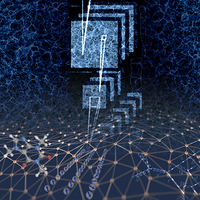当前位置:
X-MOL 学术
›
Rev. Mod. Phys.
›
论文详情
Our official English website, www.x-mol.net, welcomes your
feedback! (Note: you will need to create a separate account there.)
Machine learning and the physical sciences*
Reviews of Modern Physics ( IF 45.9 ) Pub Date : 2019-12-06 , DOI: 10.1103/revmodphys.91.045002 Giuseppe Carleo , Ignacio Cirac , Kyle Cranmer , Laurent Daudet , Maria Schuld , Naftali Tishby , Leslie Vogt-Maranto , Lenka Zdeborová
Reviews of Modern Physics ( IF 45.9 ) Pub Date : 2019-12-06 , DOI: 10.1103/revmodphys.91.045002 Giuseppe Carleo , Ignacio Cirac , Kyle Cranmer , Laurent Daudet , Maria Schuld , Naftali Tishby , Leslie Vogt-Maranto , Lenka Zdeborová

|
Machine learning (ML) encompasses a broad range of algorithms and modeling tools used for a vast array of data processing tasks, which has entered most scientific disciplines in recent years. This article reviews in a selective way the recent research on the interface between machine learning and the physical sciences. This includes conceptual developments in ML motivated by physical insights, applications of machine learning techniques to several domains in physics, and cross fertilization between the two fields. After giving a basic notion of machine learning methods and principles, examples are described of how statistical physics is used to understand methods in ML. This review then describes applications of ML methods in particle physics and cosmology, quantum many-body physics, quantum computing, and chemical and material physics. Research and development into novel computing architectures aimed at accelerating ML are also highlighted. Each of the sections describe recent successes as well as domain-specific methodology and challenges.
中文翻译:

机器学习与物理科学*
机器学习(ML)包含用于大量数据处理任务的广泛算法和建模工具,近年来已进入大多数科学学科。本文以选择性的方式回顾了有关机器学习与物理科学之间的接口的最新研究。这包括以物理见解为动力的机器学习概念发展,将机器学习技术应用于物理的多个领域以及这两个领域之间的交叉受精。在给出了机器学习方法和原理的基本概念之后,将描述一些示例,说明如何使用统计物理学来理解ML中的方法。然后,本文将介绍ML方法在粒子物理学和宇宙学,量子多体物理学,量子计算以及化学和材料物理学中的应用。还强调了对旨在加速ML的新型计算体系结构的研究和开发。每个部分都描述了最近的成功以及特定领域的方法和挑战。
更新日期:2019-12-06
中文翻译:

机器学习与物理科学*
机器学习(ML)包含用于大量数据处理任务的广泛算法和建模工具,近年来已进入大多数科学学科。本文以选择性的方式回顾了有关机器学习与物理科学之间的接口的最新研究。这包括以物理见解为动力的机器学习概念发展,将机器学习技术应用于物理的多个领域以及这两个领域之间的交叉受精。在给出了机器学习方法和原理的基本概念之后,将描述一些示例,说明如何使用统计物理学来理解ML中的方法。然后,本文将介绍ML方法在粒子物理学和宇宙学,量子多体物理学,量子计算以及化学和材料物理学中的应用。还强调了对旨在加速ML的新型计算体系结构的研究和开发。每个部分都描述了最近的成功以及特定领域的方法和挑战。











































 京公网安备 11010802027423号
京公网安备 11010802027423号